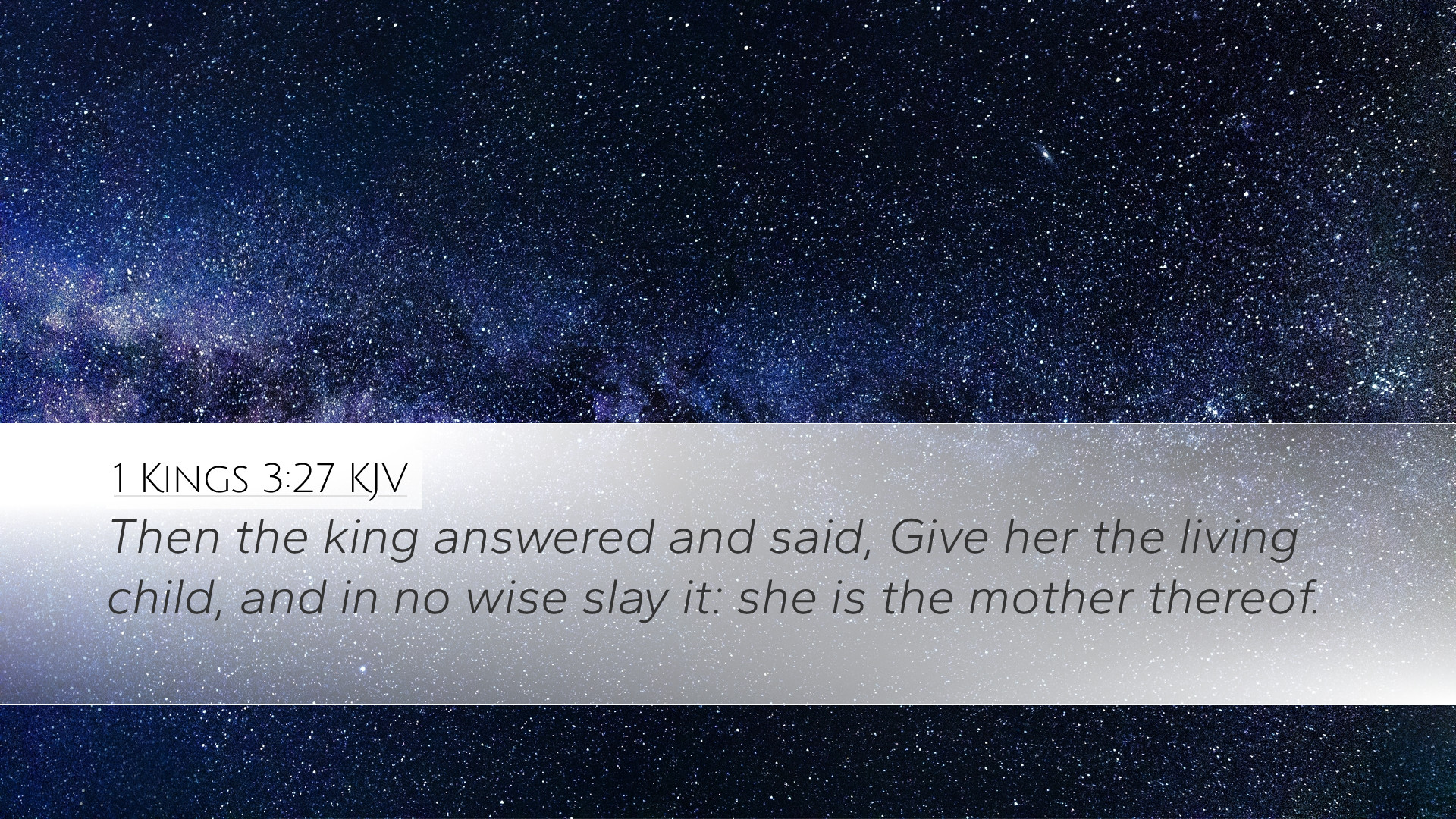Commentary on 1 Kings 3:27
The verse 1 Kings 3:27 states, “Then the king answered and said, Give her the living child, and in no wise slay it: she is the mother thereof.” This verse is a pivotal moment in the wisdom of King Solomon, showcasing his divine insight and understanding of human nature. Throughout the ages, theologians and scholars have drawn valuable lessons from this moment in Israel's history. Below is a synthesis of insights drawn from public domain commentaries by Matthew Henry, Albert Barnes, and Adam Clarke.
Context and Background
The story is set shortly after Solomon ascended to the throne of Israel. He had just been granted by God a unique opportunity to ask for anything he wished, leading to his request for wisdom. His request was pleasing to God, who not only granted him wisdom but also wealth and honor. The incident involving the two women claiming to be the mother of the same baby serves as a practical demonstration of the wisdom endowed upon Solomon.
Examination of the Text
In the preceding verse, both women presented their case before the king. Each claimed the child as her own and argued vehemently for the custody of the child. This scenario reflects the moral and emotional complexity of human relationships and the depth of a mother's love.
Solomon’s Wisdom
Solomon’s decision to propose splitting the child in two was a masterstroke of psychological insight. By threatening to divide the child, he uncovered the true mother.
-
Wisdom in Judgment: Matthew Henry notes that Solomon's wisdom enabled him to penetrate the facade of the false mother’s claim. His proposal was not an actual intention to harm the child but a strategic move to reveal the genuine mother’s love.
-
Understanding Human Nature: Albert Barnes emphasizes the understanding Solomon had of human emotions. He discerned that a true mother would rather relinquish her claim than see her child harmed, illustrating the lengths a mother would go to protect her offspring.
-
Dramatic Contrast: Adam Clarke highlights the dramatic contrast between the two women. The real mother expresses profound love and sacrifice where the false mother demonstrates selfishness and deception.
Theological Implications
1 Kings 3:27 is rich in theological implications, addressing issues of justice, divine wisdom, and the nature of true love.
-
Divine Wisdom: The divine wisdom Solomon received is an important theme. This wisdom is not merely intellectual but deeply practical, enabling the king to discern truth in a perplexing situation. It illustrates how divine wisdom operates within the earthly realm to provide justice.
-
God’s Guidance in Leadership: The incident signifies God's provision and guidance in leadership. Solomon's ability to judge rightly reflects God's blessing upon him.
-
The Nature of True Love: The true mother’s readiness to sacrifice her claims for the child’s welfare speaks to the profound nature of maternal love, which can be extrapolated to understand God's love for humanity.
Lessons for Pastors and Theologians
For pastors and theologians, this verse offers several lessons applicable in ministry and theological discourse.
-
Necessity of Wisdom in Leadership: Spiritual leaders are reminded of the importance of seeking divine wisdom in situations requiring discernment and justice.
-
Empathy in Pastoral Care: Understanding the emotional struggles of individuals is crucial. The response of Solomon reflects the need for compassion and insight in pastoral care.
-
Encouragement to Seek God: Pastors may encourage their congregations to seek God’s wisdom in their personal dilemmas, illustrating through this story how the Lord responds to genuine requests for help.
Application to Contemporary Issues
The principles seen in this verse are timeless, offering guidance in modern contexts.
-
Conflict Resolution: The approach Solomon took to resolve the issue advocates for thoughtful engagement in resolving conflicts, whether in families, communities, or church settings.
-
Value of Maternal Love: The unwavering nature of a mother’s love is celebrated and recognized, serving as a reminder of the advocacy for the vulnerable in society today.
Conclusion
The account of King Solomon's judgment in 1 Kings 3:27 provides a profound narrative demonstrating the power and necessity of wisdom in leadership. As believers and scholars reflect upon this passage, they are called to consider the deeper implications of justice, love, and divine guidance that the story encapsulates. The insights drawn from esteemed commentators underscore the timeless relevance of this verse, challenging us to embody such wisdom and compassion in our daily lives and ministries.


